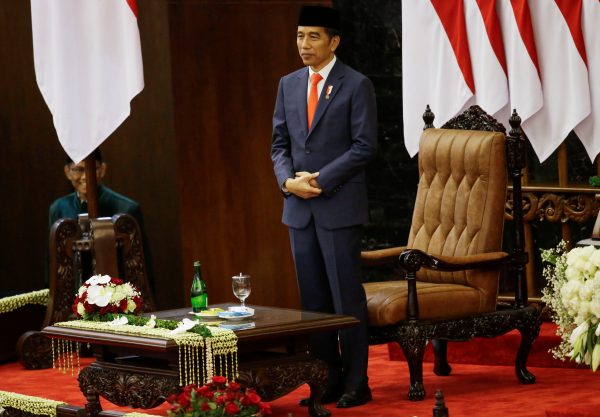Those words might have been encouraging to Indonesians and foreigners who have been calling for more leadership from the President on economic reform and strengthening democratic institutions. They will once again be disappointed. The second-term Jokowi, experts say, is going to be a lot like the first: singularly obsessed with his vision of economic growth and modernisation, politically risk averse, and disdainful of the liberal good governance agendas advocated by civil society and foreign investors.
As Dave McRae and Robertus Robet write in this week’s lead article, ‘Jokowi is again showing he is willing to subjugate individual rights and the fight against corruption to other considerations’. Their observations echo those of the prominent Indonesian academic and pollster Burhanuddin Muhtadi who, in the latest East Asia Forum Quarterly, writes that ‘entrenched oligarchic forces that have defined Indonesian politics since the New Order era have certainly exploited Jokowi’s indifference towards democratic reform and anti-corruption efforts’.
Jokowi’s indifference to democratic norms is well documented. Reducing corruption, meanwhile, is one area where an ‘unburdened’ Jokowi might plausibly have deployed some political capital. Most international observers see the relationship between controlling corruption and boosting Indonesia’s economic performance as axiomatic. Red tape, the ubiquity of bribery, and having to compete with rent-seekers who improperly influence officials all inhibit investment in many sectors.
Things look different to many of the Indonesian elites Jokowi aligns with though. They frame the aggressive pursuit of corrupt officials as politically disruptive. There is plenty of self-interest in promoting this narrative, to be sure — but many of them still take it for granted that corruption is a natural part of the statist and corporatist visions of economic development that are ideologically fashionable in Indonesia.
At the start of his second term, Jokowi has embraced this conservative viewpoint. That’s why he gave tacit support to the Indonesian parliament when in September it passed revisions to a 2002 anti-corruption law, changes which McRae and Robet argue will ‘significantly weaken the institutional standing of the KPK’, Indonesia’s respected — and, among politicians, feared — anti-corruption agency. Amendments to the law will reduce the KPK’s ability to independently investigate and prosecute officials, as well as increase the role of political appointees in determining who gets prosecuted and when.
The outcry over the weakening of the KPK became a unifying cause for tens of thousands of students who took to the streets in protest in late September; also among their grievances were a draconian proposed new criminal code and various other bills deemed hostile to the interests of farmers, workers and activists.
‘The risk for Jokowi lies in the fact that each move to erode anti-corruption efforts and individual rights’, say McRae and Robet. ‘makes [Jokowi] ever less distinguishable from the system that Indonesians voted against when they first elected a political outsider as president’.
Yet in the weeks and months since, the protest movement has waned. With popular discontent having died down, Jokowi has announced that he has no intention to reverse the changes to the anti-corruption law through a decree, as the students and their civil society allies demanded he do. Having ridden out September’s protests, ‘Jokowi’, McRae and Robet conclude, ‘appears to have calculated he can navigate his way through this discontent’.
How are we to understand Jokowi’s compromises? As Muhtadi acknowledges, ‘Jokowi’s economic reform agenda will not run smoothly without the political support of the oligarchs and political cartels’. Capital injections for state-owned firms to build infrastructure, streamlining of economic legislation, subsidy reforms — political parties and the oligarchs who control them are all potential veto players in the political deal-making which lies behind ‘Jokowinomics’.
Oligarchic groups have ‘not only have total control over the political parties but are also part of an elite economic class that controls the material resources steering the course of Indonesian politics’, says Muhtadi. ‘They joined forces in passing revisions to the KPK Law — which contain articles on weakening the KPK — to undermine the anti-corruption agenda. They also tried to pass various other revisions to the law in favour of their narrow interests’.
For Indonesia to stimulate investment and attract much-needed foreign capital, the country needs more than new highways and airports. It needs an accountable political system and a reliable bureaucracy that serves the country and not itself or the oligarchs. The hobbling of the KPK in Jokowi’s second term suggests that the hard reforms must await Jokowi’s successor.
The EAF Editorial Board is located in the Crawford School of Public Policy, College of Asia and the Pacific, The Australian National University.

